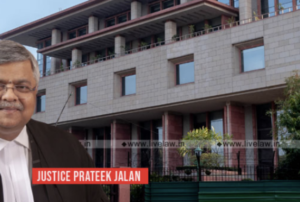
Arbitration Clause In A Contract Perishes With Its Novation: Delhi High Court

The Delhi High Court recently ruled that an arbitration clause in a contract perishes with its novation.
This ruling came after the court was presented with a dispute between two parties over the terms of
their original agreement.
The court heard arguments from both sides and ultimately found that when one party to an existing contract wishes to make changes, or “novate” it, all clauses including any arbitration provisions become void and unenforceable unless explicitly agreed upon by both parties again in writing.

This is important because it affects how disputes are handled between contracting parties going
forward. In many cases where contracts are amended or replaced, there may be some confusion as to
which clauses remain valid and enforceable under the new agreement versus those which have been
voided due to novation of the original document.
Now if either party wants an arbitration provision included in their renewed agreement they must clearly state so for this clause not only survive but also be legally binding on them should any future disputes arise between them related thereto .
In summary, this case serves as reminder for businesses entering into agreements that they need
ensure each element is properly documented and agreed upon before signing off on anything else
otherwise certain contractual provisions could end up being invalidated without either side realizing
until much later down line when such issues come up during litigation proceedings making resolution
more difficult than necessary had proper documentation been done at outset .

Arbitration Clause In A Contract Perishes With Its Novation is a legal principle that has been established by the Delhi High Court. This rule states that an arbitration clause in a contract will cease to exist upon novation of the contract.
This means that when two parties agree to modify or replace an existing agreement with another, then any arbitration clause contained within the original agreement ceases to be valid and unenforceable.
The rationale behind this ruling was based on logic and fairness; it would not make sense for one party
to have access rights under an old contract while other parties are bound by new terms in a revised
version of said agreement.
The court held that if there had been intent from both sides regarding continuation of such clauses, they should have explicitly mentioned so in their new arrangement as well as making sure all relevant documents were updated accordingly .
In Conclusion, Arbitration Clause In A Contract Perishes With Its Novation is important because it
ensures fair treatment between all involved parties regardless whether they are revising or replacing
contracts entirely or just making minor changes here and there – especially when disputes arise later
down line which may require resolution through mediation services like those provided by arbitrators
appointed via arbitration clauses found within contracts prior .Arbitration Clause in a contract
perishes with its novation is an important legal principle established by the Delhi High Court.
This principle has been applied to various cases involving contractual disputes. The court held that when a new contract replaces an existing one, any arbitration clause present in the old agreement will be
rendered invalid and unenforceable under law.
This means that if parties wish to include arbitration clauses in their contracts, they must ensure these are included as part of each new agreement or else risk them becoming null and void upon renewal or replacement of the original document.
The Delhi High Court first established this precedent while ruling on a dispute between two companies over payment for goods supplied under their original contract which was replaced by another after some
time had elapsed since signing it originally .
In this case, there was no mention of any form of alternative dispute resolution ADR such as mediation or arbitration within either version but due to previous dealings between both firms ,the court ruled that even though there were differences between both agreements ,any reference made towards ADR would not remain valid once replaced with newer versions .

As such it set out what has now become known as arbitration clause perishes rule – meaning all arbitrations clauses contained within older documents automatically lose validity upon being superseded by later ones containing different terms & conditions .
This decision from the Delhi High Court serves as reminder for businesses entering into contracts
they should always make sure to include references towards ADRs like mediation/arbitration when drafting agreements so these can remain enforceable even if future changes occur down line-updating language used may also help prevent misunderstandings related thereto at later stages too!
Ultimately however, regardless how much effort is put into ensuring continuity across multiple
versions – without explicit inclusion therein provisions concerning alternative forms conflict resolution shall cease to exist upon replacing earlier drafts thus making it essential to incorporate the
same right away before proceeding further ahead.
Arbitration Clause
In A Contract Perishes With Its Novation is an important legal concept that has been recently discussed in the Delhi High Court. This ruling came about when a company, who had entered into a contract with another party, sought to have their agreement modified and updated through novation.
The court determined that any arbitration clause contained within the original contract would perish along with its novation and could not be carried over or enforced as part of the new agreement.
The rationale behind this decision was based on two key points: firstly, it was noted that parties are
free to agree upon whatever terms they deem fit for their contractual relationship; secondly, if one
party does decide to modify or update the existing arrangement then it should not be assumed that
all clauses from before will remain applicable unless explicitly stated otherwise by both sides involved
in the negotiation process. As such, any arbitration clause present within an original contract will
perish upon its novation unless there is express language indicating otherwise between both parties
concerned.
This ruling serves as an important reminder of how vital it is for companies entering into contracts to
ensure they understand all aspects of what they are agreeing too including potential changes which
may arise due to future agreements being made between them and other third-parties involved in
such arrangements – especially when those modifications involve something like a dispute resolution
mechanism like arbitration clauses can provide!
It also highlights just how much power each side holds during negotiations so long as they take care when drafting out their initial agreements together properly beforehand while also keeping up-to-date on case law developments related thereto if
applicable.








